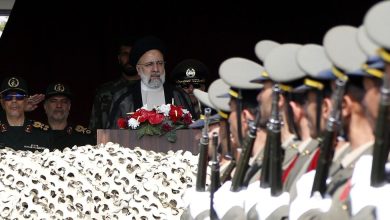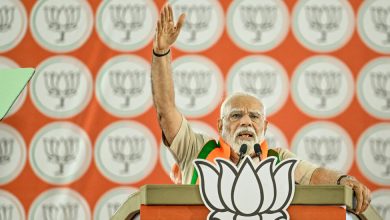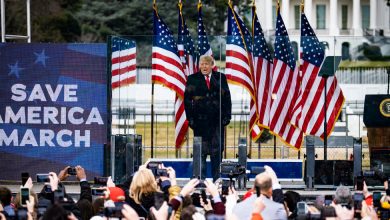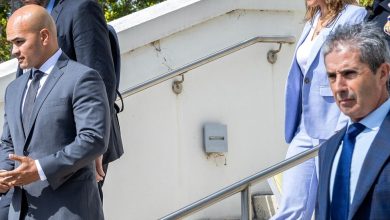Queen Misses a Traditional Ceremony, at a Disorderly Moment for Britain

LONDON — Britain opened its Parliament on Tuesday with all the pomp of an age-old ceremony: the imperial crown, carried on a velvet pillow; members of the royal family, parading through the House of Lords in military regalia; and the Queen’s Speech, setting out the government’s legislative agenda.
Only this time, Prince Charles read the speech, filling in for Queen Elizabeth II, who missed the ceremony, one of her most solemn constitutional duties, for only the third time in 70 years. Her absence was striking, and a poignant metaphor for a country in which multiple pillars of the establishment, from Buckingham Palace to Westminster, are in flux.
The queen, 96, canceled the night before because she was having trouble walking, according to the palace. It was the first time she had formally ceded her responsibilities to her eldest son and heir, Charles, a clear sign that the British monarchy has taken on the elements of a regency, in fact if not in law.
“The king in waiting is having to act more and more like he’s the monarch, but without yet wearing the crown,” said Peter Hunt, a former royal correspondent for the BBC. “As the queen has aged, change has occurred without any fanfare.”
She is not the only prominent figure at a crossroads. Prime Minister Boris Johnson, already scarred by a scandal over illicit parties held during the pandemic, is clinging to power after his Conservative Party suffered setbacks in local elections last week.
The opposition leader, Keir Starmer, who has been trying to leverage Mr. Johnson’s travails into a return to power for Labour, is on the defensive himself for potentially breaching Covid restrictions by eating and drinking with members of his party. He has vowed to resign if the police fine him for breaking the rules.
And the government itself faces a surfeit of challenges, including galloping inflation and the threat of a recession, and another potential clash with the European Union over trade rules in Northern Ireland. In one of the speech’s first lines, Charles said that the government would “help ease the cost of living for families.”
As expected, the government did not announce plans to overturn the trade arrangements with Northern Ireland. But it may do so in coming weeks; there was pointed language about its determination to preserve the economic bonds between the parts of the United Kingdom — something that critics say is undermined by the post-Brexit trade rules in the North.
Scrapping those rules would reverberate widely, potentially igniting a trade war with the European Union and antagonizing the Biden administration. Washington has warned Mr. Johnson not to take steps that could undermine the 1998 Good Friday Agreement, which ended decades of sectarian bloodshed in Northern Ireland and is important to President Biden.
A landmark victory by the Irish nationalist party, Sinn Fein, in legislative elections in the North last week has further roiled the waters. Angry unionists are refusing to take part in a government with a Sinn Fein politician at the helm, potentially portending years of dysfunction in Belfast. The rise of the nationalists has kindled hopes for Irish unity, a potentially alarming development for a British government already confronting an independence-minded Scotland.
“The continued success and integrity of the whole of the United Kingdom is of paramount importance,” Prince Charles read out in the speech.
Charles also affirmed Britain’s staunch role in supporting Ukraine in the war with Russia. Mr. Johnson’s enthusiastic embrace of Ukraine’s president, Volodymyr Zelensky, and Britain’s proactive agenda of providing weapons, has helped him change the subject in recent weeks from months of bad headlines.
Mr. Johnson survived last week’s election, despite his party’s losing nearly 500 seats in local government, an outcome at the dismal end of expectations. On Tuesday, he sought to regain his footing, using the Queen’s Speech to promote deregulatory policies that will aim to capitalize on Britain’s divorce from Brussels.
He was helped by the spotlight swinging awkwardly to Mr. Starmer, who is now under police investigation for attending a beer-and-Indian-food dinner in the north of England last year at a time when most social gatherings were forbidden. He denies breaking the law but has said that he will step down if the police find that he did, drawing a distinct — and certainly deliberate — contrast with Mr. Johnson, who has refused to resign, even after paying a fine.
For his part, Mr. Johnson also faces further fines and the publication of findings by the government’s internal investigator, Sue Gray, who is likely to paint a damning picture of the alcohol-fueled culture in Downing Street.
Some Key Moments in Queen Elizabeth’s Reign
Becoming queen. Following the death of King George VI, Princess Elizabeth Alexandra Mary ascended to the throne on Feb. 6, 1952, at age 25. The coronation of the newly minted Queen Elizabeth II took place on June 2 the following year.
A historic visit. On May 18, 1965, Elizabeth arrived in Bonn on the first state visit by a British monarch to Germany in more than 50 years. The trip formally sealed the reconciliation between the two nations following the world wars.
First grandchild. In 1977, the queen stepped into the role of grandmother for the first time, after Princess Anne gave birth to a son, Peter. Elizabeth’s four children have given her a total of eight grandchildren, who have been followed by several great-grandchildren.
Princess Diana’s death. In a rare televised broadcast ahead of Diana’s funeral in 1997, Queen Elizabeth remembered the Princess of Wales, who died in a car crash in Paris at age 36, as “an exceptional and gifted human being.”
Golden jubilee. In 2002, celebrations to mark Elizabeth II’s 50 years as queen culminated in a star-studded concert at Buckingham Palace in the presence of 12,000 cheering guests, with an estimated one million more watching on giant screens set up around London.
A trip to Ireland. In May 2011, the queen visited the Irish Republic, whose troubled relationship with the British monarchy spanned centuries. The trip, infused with powerful symbols of reconciliation, is considered one of the most politically freighted trips of Elizabeth’s reign.
Breaking a record. As of 5:30 p.m. British time on Sept. 9, 2015, Elizabeth II became Britain’s longest-reigning monarch, surpassing Queen Victoria, her great-great-grandmother. Elizabeth was 89 at the time, and had ruled for 23,226 days, 16 hours and about 30 minutes.
Marking 70 years of marriage. On Nov. 20, 2017, the queen and Prince Philip celebrated their 70th anniversary, becoming the longest-married couple in royal history. The two wed in 1947, as the country and the world was still reeling from the atrocities of World War II.
Losing her spouse. In 2021, Queen Elizabeth II bade farewell to Prince Philip, who died on April 9. An image of the queen grieving alone at the funeral amid coronavirus restrictions struck a chord with viewers at home following the event.
Whatever the pressures they were under, Mr. Johnson and Mr. Starmer managed to chat cordially, even smiling a bit, as they walked to the House of Lords together on Tuesday to listen to the Queen’s Speech.
By tradition, lawmakers were summoned from the House of Commons by a figure called the lady usher of the black rod, who, as a representative of the lords, first had the door slammed in her face as a symbolic sign of the independence of the Commons.
It was one of a choreographed series of moves on a day that would normally be reassuringly familiar — except for the lack of its principal player. The queen’s decision to cancel, taken reluctantly after consulting her doctors, came after she suffered “episodic mobility problems,” the palace said on Monday evening.
The decision to have Charles read the Queen’s Speech sent royal legal experts rushing to their rule books. It was a “constitutional innovation,” said Vernon Bogdanor, a professor of government at King’s College London who has written about the role of the monarchy in Britain’s constitutional system.
On the two previous times that the queen has missed the opening — in 1959 and 1963, both when she was pregnant — the lord chancellor read her speech. But Professor Bogdanor said that the lord chancellor post had changed over the years: The current occupant, Dominic Raab, is a member of the House of Commons and the justice minister in Mr. Johnson’s government, making him a less suitable stand-in.
To invest her son with the authority to read the speech, the queen had to issue a legal decree, known as a Letters Patent. The decree also designated her grandson Prince William, the eldest son of Charles, as another of her representatives at the ceremony. Such a delegation of royal duties is almost unheard-of for the queen, who has pledged since the dawn of her reign that she would serve until her death.
Legally speaking, though, Britain is not in a regency, according to Professor Bogdanor. To qualify for that status, he said, three of five senior British officials — Prince Charles, the lord chancellor, the speaker of the House of Commons, the lord chief justice and the master of the rolls — would have to agree that the queen was permanently incapable of carrying out her duties.
“There is no evidence that this is the case,” Professor Bogdanor said. “Given the development of modern technology, the queen can continue to perform her constitutional functions without actually being present physically.”
Stephen Castle contributed reporting



